(完整word版)小学牛津英语译林版6B英语知识点
新译林英语6B_全册知识点梳理(重点词汇、句型、语法知识整理)
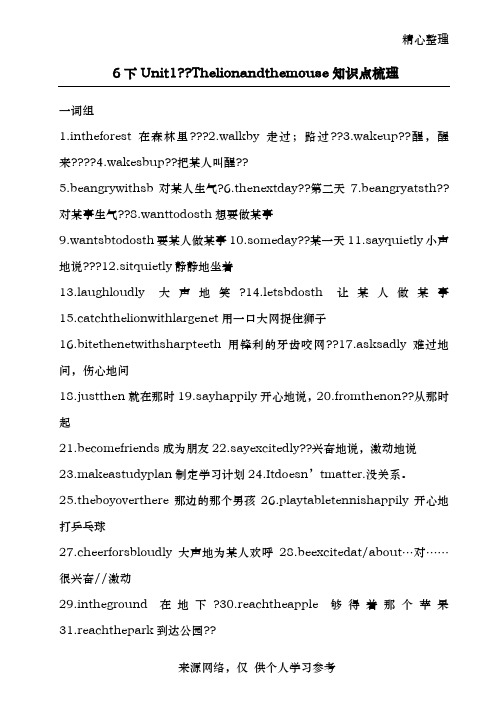
精心整理6下Unit1??Thelionandthemouse知识点梳理一词组1.intheforest在森林里???2.walkby走过;路过??3.wakeup??醒,醒来????4.wakesbup??把某人叫醒??5.beangrywithsb对某人生气?6.thenextday??第二天7.beangryatsth??对某事生气??8.wanttodosth想要做某事9.wantsbtodosth要某人做某事10.someday??某一天11.sayquietly小声地说???12.sitquietly静静地坐着ughloudly大声地笑?14.letsbdosth让某人做某事15.catchthelionwithlargenet用一口大网捉住狮子16.bitethenetwithsharpteeth用锋利的牙齿咬网??17.asksadly难过地问,伤心地问18.justthen就在那时19.sayhappily开心地说,20.fromthenon??从那时起21.becomefriends成为朋友22.sayexcitedly??兴奋地说,激动地说23.makeastudyplan制定学习计划24.Itdoesn’tmatter.没关系。
25.theboyoverthere那边的那个男孩26.playtabletennishappily开心地打乒乓球27.cheerforsbloudly大声地为某人欢呼28.beexcitedat/about…对……很兴奋//激动29.intheground在地下?30.reachtheapple够得着那个苹果31.reachthepark到达公园??32.haveanidea??有一个主意33.bringsomewaterquickly很快拿来水??34.pour…into….??把……倒入……35.Welldone.干得很好。
做的不错??36.somanyballs如此多的求37.somuchbread如此多的面包??????38.take…to…把…….带到…….39.becomehappy变得很开心40.getout 出来,出去二、难点句子1.?Thelionwasangryandwantedtoeatthemouse.这只狮子很生气想要吃那只老鼠。
译林版牛津英语6b全册课文中文翻译
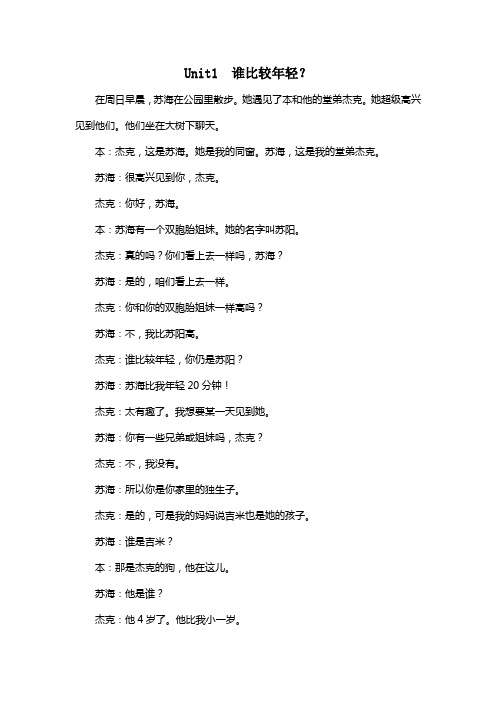
Unit1 谁比较年轻?在周日早晨,苏海在公园里散步。
她遇见了本和他的堂弟杰克。
她超级高兴见到他们。
他们坐在大树下聊天。
本:杰克,这是苏海。
她是我的同窗。
苏海,这是我的堂弟杰克。
苏海:很高兴见到你,杰克。
杰克:你好,苏海。
本:苏海有一个双胞胎姐妹。
她的名字叫苏阳。
杰克:真的吗?你们看上去一样吗,苏海?苏海:是的,咱们看上去一样。
杰克:你和你的双胞胎姐妹一样高吗?苏海:不,我比苏阳高。
杰克:谁比较年轻,你仍是苏阳?苏海:苏海比我年轻20分钟!杰克:太有趣了。
我想要某一天见到她。
苏海:你有一些兄弟或姐妹吗,杰克?杰克:不,我没有。
苏海:所以你是你家里的独生子。
杰克:是的,可是我的妈妈说吉米也是她的孩子。
苏海:谁是吉米?本:那是杰克的狗,他在这儿。
苏海:他是谁?杰克:他4岁了。
他比我小一岁。
苏海:哦,我明白了。
所以你有一个弟弟。
Unit2 更多锻炼吉姆擅长英语和数学,可是他不擅长体育。
他想要做得好一些可是不知道如何做。
他正在和他的父亲讨论关于它的事情。
吉姆:爸爸,我不高兴。
爸爸:怎么了?你做作业需要帮忙吗?吉姆:不。
我不擅长体育。
本跑得比我快。
他很强壮。
麦克和本跑得一样快,而且他也是一名优秀的足球运动员。
爸爸:可是我以为你跳得超级高。
吉姆:那是固然。
我比我班级里面的一些男孩跳的高。
爸爸:而且你游泳游得快。
吉姆:是的,可是我的朋友们比我游得快。
爸爸:别担忧。
多做些运动。
你会变得更强壮,而且你将更擅长体育。
吉姆:是的,爸爸。
天天我将起得更早而且在上学之前做些运动。
爸爸:真是一个好主意。
吉姆:我会在早晨慢跑去学校而且在下学后玩球类游戏。
不就我将会变得更强壮。
Unit3 问路史密斯先生来自澳大利亚,他此刻住在南京,他想去参观历史博物馆,可是他不知道路,他在问杨玲怎么去那。
史密斯先生:打搅一下,请问你能告知我去历史博物馆的路吗?杨玲:让我看看,额,沿着这条街,在第三个路口右转,博物馆就在你的左侧,你不会错过的。
六上英语译林版知识点汇总

六上英语译林版知识点汇总
一、词汇
1. 四会单词:学生需要掌握四会单词,即会听、说、读、写。
这些单词包括常用的名词、动词、形容词、副词等。
2. 习惯用语:学生需要掌握一些常见的习惯用语,如问候、道别、感谢、道歉等常用表达方式。
二、语法
1. 现在进行时:学生需要掌握现在进行时的构成和用法,如“I am doing my homework now.”等。
2. 一般现在时:学生需要掌握一般现在时的构成和用法,如“I usually get up at 7 o’clock every day.”等。
3. 一般过去时:学生需要掌握一般过去时的构成和用法,如“She went to the park last weekend.”等。
三、语音
学生需要掌握元音字母及常见字母组合的发音,如“ea”、“ai”、“ay”等。
此外,还需要了解重音和语调的规则。
四、句型
学生需要掌握陈述句、疑问句和祈使句的构成和用法,如“I have a new friend.”、“Do you like apples?”和“Please sit down.”等。
五、情景交际
学生需要在不同的情境中运用所学句型进行交流,如购物、问
路、打电话等。
此外,还需要了解不同国家的文化和习惯用语。
(完整word版)苏教版英语五年级1-8单元默写
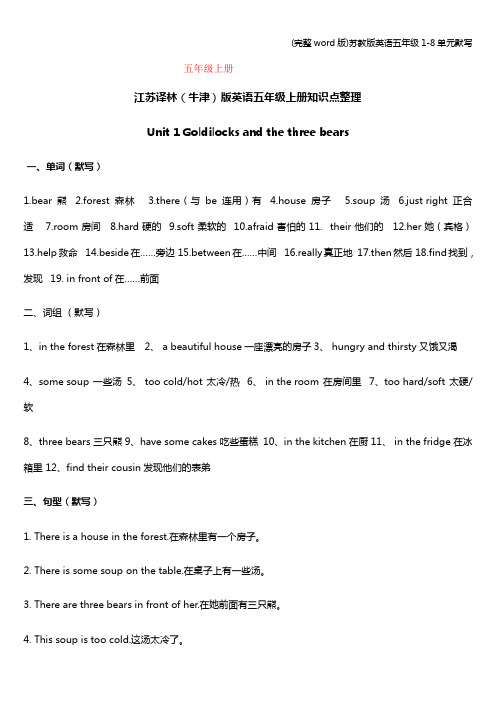
五年级上册江苏译林(牛津)版英语五年级上册知识点整理Unit 1 Goldilocks and the three bears一、单词(默写)1.bear熊2.forest森林3.there(与be连用)有4.house房子5.soup汤6.just right正合适7.room房间8.hard硬的9.soft柔软的10.afraid害怕的11. their他们的12.her她(宾格)13.help救命14.beside在……旁边 15.between在……中间 16.really真正地17.then然后 18.find找到,发现19. in front of在……前面二、词组(默写)1、in the forest在森林里2、 a beautiful house一座漂亮的房子3、 hungry and thirsty又饿又渴4、some soup一些汤5、 too cold/hot太冷/热6、 in the room在房间里7、too hard/soft太硬/软8、three bears 三只熊9、have some cakes吃些蛋糕10、in the kitchen在厨11、 in the fridge在冰箱里 12、find their cousin发现他们的表弟三、句型(默写)1. There is a house in the forest.在森林里有一个房子。
2. There is some soup on the table.在桌子上有一些汤。
3. There are three bears in front of her.在她前面有三只熊。
4. This soup is too cold.这汤太冷了。
5. What a beautiful house! 多么漂亮的房子!6. She is hungry and thirsty.她是又饿又渴。
7.Bobby cannot(can’t) see any cakes in the fridge. 波比看不到冰箱里有蛋糕。
译林小学六年级的英语上册的学习知识点汇总

WORD 格式可编写译林 6 年级上册英语知识点汇总6A Unit 1 The king's new clothes一. Words:magic 有魔力的 , 奇特的clever聪慧的foolish愚笨的child孩子through穿过laugh笑,大笑wear穿tell讲,表达hard努力地,费劲地each 每个say说sentence句子quick快速的,快的next 下一个little小的,年幼的turn时机think想,思虑二. Phrases:long long ago 好久从前turn into变为one day 一天try on 试穿walk through走过look at看point at指着laugh at 嘲讽look after照料in the street在街上on the mountain在山上in the house在房屋里in the forest在丛林里make new clothes做新衣服三. Sentences:1.Long long ago,there was a king.好久从前,有一个皇帝。
2.One day,two men visited the king.一天,两个男人拜见了皇帝。
3.The king was happy.皇帝很快乐。
4.What beautiful clothes!多么美丽的衣服啊!5.The two men showed the king his new clothes.那两个男人给皇帝展现了他的新衣服。
专业技术分享WORD 格式可编写6.Miss Fox and her students are playing a game.狐狸老师正在和她的学生们玩游戏。
四. Grammer:1.观点在过去某个时间里发生的动作或存在的状态:过去习惯性或常常性的动作、行为。
2.时间状语ago,yesterday,the day before yesterday,lastweek(year,night,month? ),in 1989,just now,long long ago,once upon a time. 3.一定句主语 +行为动词(过去式)+ 其余。
(word版)江苏译林版英语五年级上册知识点及练习
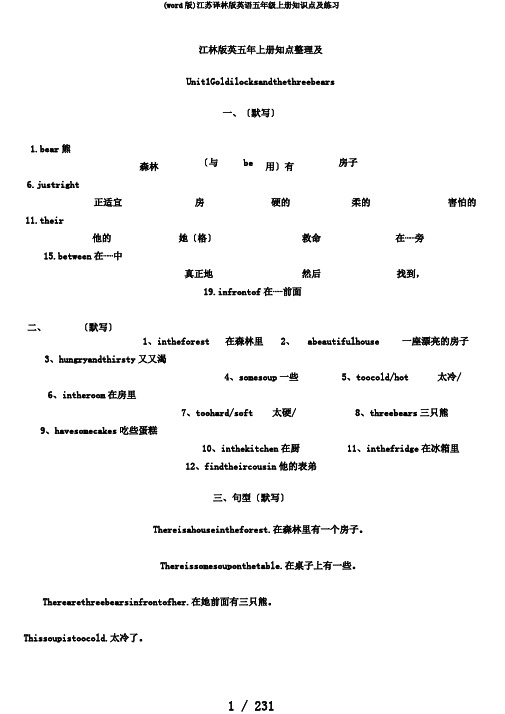
江林版英五年上册知点整理及Unit1Goldilocksandthethreebears一、〔默写〕1.bear熊森林〔与be用〕有房子6.justright正适宜房硬的柔的害怕的11.their他的她〔格〕救命在⋯⋯旁15.between在⋯⋯中真正地然后找到,19.infrontof在⋯⋯前面二、〔默写〕1、intheforest在森林里2、abeautifulhouse一座漂亮的房子3、hungryandthirsty又又渴4、somesoup一些5、toocold/hot太冷/6、intheroom在房里7、toohard/soft太硬/8、threebears三只熊9、havesomecakes吃些蛋糕10、inthekitchen在厨11、inthefridge在冰箱里12、findtheircousin他的表弟三、句型〔默写〕Thereisahouseintheforest.在森林里有一个房子。
Thereissomesouponthetable.在桌子上有一些。
Therearethreebearsinfrontofher.在她前面有三只熊。
Thissoupistoocold.太冷了。
Whatabeautifulhouse!多么漂亮的房子!Sheishungryandthirsty.她是又又渴。
7.Bobbycannot(can’t)seeanycakesinthefridge.波比看不到冰箱里有蛋糕。
四.法点〔理解〕Therebe句型表示“某处有某物〞〔1〕其中thereis 用于单数名词或不可数名词,如:Thereisapencilcaseintheschoolbag.Thereissomesoup/milk/tea/coffee/juice/water/chocolate.〔2〕Thereare用于可数名词的复数,如:Therearesomedesksintheclassroom.〔3〕Therebe句型的就近原那么:be动词后面如果跟的是不止一种物品,就根据离它最近的物品选用is或are.如:Therearesomepicturesandatelephone.Thereisatelephoneandsomepictures.2.Therebe句型的否认形式:在be动词的后面加not〔isnot可以缩写为isn't,arenot可以缩写为aren't〕把some改成any。
译林版六年级英语上册各单元知识点归类整理(第一学期期末复习资料重点归纳)
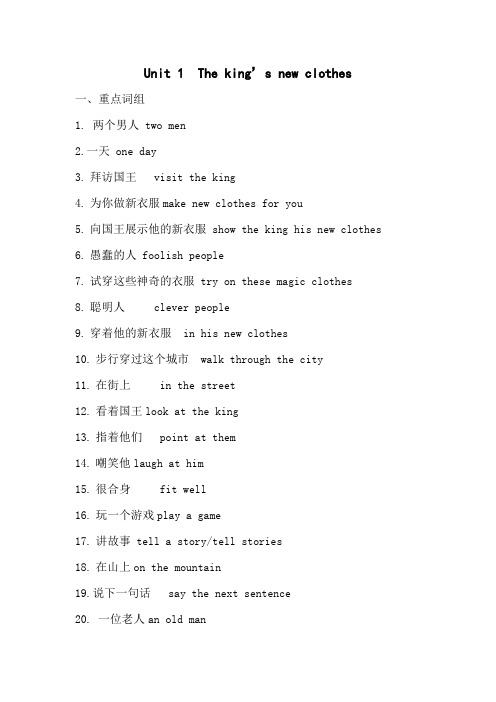
Unit 1 The king’s new clothes一、重点词组1. 两个男人 two men2.一天 one day3.拜访国王 visit the king4.为你做新衣服make new clothes for you5.向国王展示他的新衣服 show the king his new clothes6.愚蠢的人 foolish people7.试穿这些神奇的衣服 try on these magic clothes8.聪明人 clever people9.穿着他的新衣服 in his new clothes10.步行穿过这个城市 walk through the city11.在街上 in the street12.看着国王look at the king13.指着他们 point at them14.嘲笑他laugh at him15.很合身 fit well16.玩一个游戏play a game17.讲故事 tell a story/tell stories18.在山上on the mountain19.说下一句话 say the next sentence20. 一位老人an old man21.住在这个房子里 live in the house22. 给这个小男孩讲一个故事tell the little boy a story23.认真思考 think hard24. 又得重新开始这个故事了have to start the story again25.从她那得到一张卡片 get a card from her26.在四点半 at half past four27.一个美国牛仔 an American cowboy28.穿着牛仔裤 wear jeans29.一个苏格兰男士 a Scottish man30.穿一条苏格兰短裙 wear a kilt31.住在两座山后 live behind two mountains32. 对他的家人说 say to his family33.努力工作 work hard34.累却快乐着 be tired but happy35. 在森林里 in the forest36.一些动物 some animals二、重点句子1.多么漂亮的衣服啊! What beautiful clothes!2.国王没有穿任何衣服。
译林版六年级下册学习重点归纳
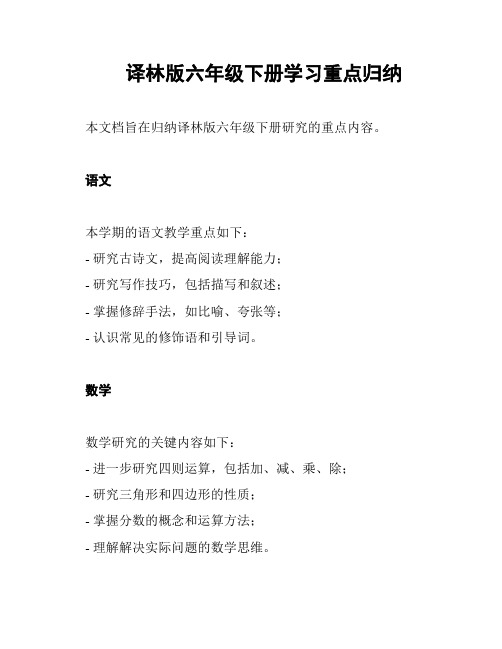
译林版六年级下册学习重点归纳本文档旨在归纳译林版六年级下册研究的重点内容。
语文
本学期的语文教学重点如下:
- 研究古诗文,提高阅读理解能力;
- 研究写作技巧,包括描写和叙述;
- 掌握修辞手法,如比喻、夸张等;
- 认识常见的修饰语和引导词。
数学
数学研究的关键内容如下:
- 进一步研究四则运算,包括加、减、乘、除;
- 研究三角形和四边形的性质;
- 掌握分数的概念和运算方法;
- 理解解决实际问题的数学思维。
英语
英语研究的重点包括:
- 研究日常交际用语及基本句型;
- 认识常用的动词和名词;
- 听、说、读、写全面提高;
- 能够运用所学知识进行简单对话。
科学
本学期的科学研究重点如下:
- 掌握有关光、电、水的知识;
- 研究科学实验的基本步骤;
- 加强科学观察和实践能力;
- 培养科学思维和探究精神。
社会
社会学科的重点内容包括:
- 研究我国的行政区划和主要自然地理特点;
- 理解社会生活中的公平、公正和平等的概念;
- 了解我国的历史文化和名人事迹;
- 培养良好的社会行为和公民意识。
以上是本学期译林版六年级下册的学习重点归纳,希望能对同学们的学习有所帮助。
译林版小学英语B知识点
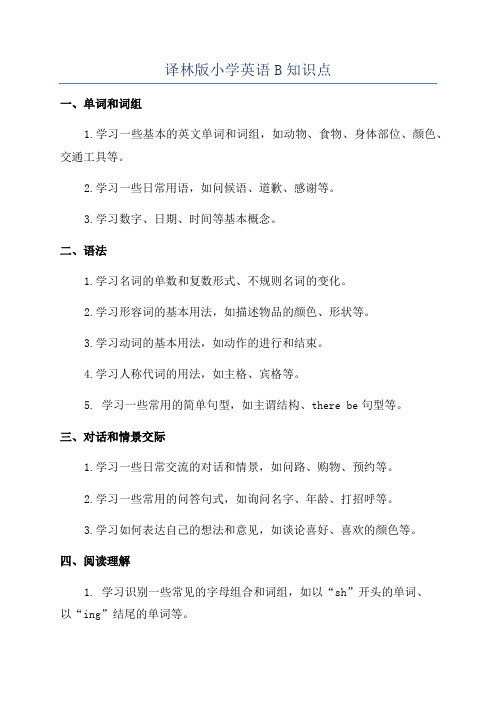
译林版小学英语B知识点一、单词和词组1.学习一些基本的英文单词和词组,如动物、食物、身体部位、颜色、交通工具等。
2.学习一些日常用语,如问候语、道歉、感谢等。
3.学习数字、日期、时间等基本概念。
二、语法1.学习名词的单数和复数形式、不规则名词的变化。
2.学习形容词的基本用法,如描述物品的颜色、形状等。
3.学习动词的基本用法,如动作的进行和结束。
4.学习人称代词的用法,如主格、宾格等。
5. 学习一些常用的简单句型,如主谓结构、there be句型等。
三、对话和情景交际1.学习一些日常交流的对话和情景,如问路、购物、预约等。
2.学习一些常用的问答句式,如询问名字、年龄、打招呼等。
3.学习如何表达自己的想法和意见,如谈论喜好、喜欢的颜色等。
四、阅读理解1. 学习识别一些常见的字母组合和词组,如以“sh”开头的单词、以“ing”结尾的单词等。
2.学习理解短文中的基本信息,如文章的主旨、人物、时间等。
3.学习如何从短文中找寻答案,如通过问题定位关键信息。
4.学习理解简单的图表和图片,如认识不同的动物、事物等。
五、听力训练1.听写数字、家庭成员、时间等基本信息。
2.听取指令和描述,如指示地点、指导做事情等。
3.听取简短故事和对话,以理解基本内容和要点。
六、写作技巧1.学习如何记录自己的个人信息,如名字、年龄、家庭背景等。
2.学习写作简单的句子和段落,如描述自己的家庭、学校等。
3.学习如何写作简单的问候卡、请假条等。
七、口语表达1.学习正确发音和语调,如元音、辅音等。
2.学习如何进行简单的口语交流,如问候、介绍自己等。
3.学习如何描述物品的外貌、颜色等。
八、文化史知识1.介绍英语国家的文化和传统,如圣诞节、万圣节等节日。
2.介绍一些英语国家的名胜景点,如伦敦塔桥、纽约时报广场等。
译林小学英语六下U1~4 知识点

Unit 1 The Lion and the mouse一、音调Intonation 降调:特殊疑问句的句尾用降调。
二、单词(四会) rge 大的2.strong 强壮的3. quietly 安静地4.weak 虚弱的5.loudly 大声地6. happily 高兴地 (三会) 6. mouse 老鼠7. net 网 8. bite 咬 9. sharp 锋利的 10. sadly 悲伤地 11. soon 不久12. cheer 向……欢呼 13. hit 击 14. deep 深的 15. reach 到达 16. quickly 快速地三、词组(四会) 1. large and strong 又大又强壮3. walk by 走过5. say quietly 小声地说7. laugh loudly 大声地笑9. ask sadly 悲伤地问11. say happily 开心地说13. just then 就在那时15. from then on 从那以后(三会)17. play table tennis happily 开心地打乒乓 19.cheer for them loudly 为他们大声欢呼 21. hit the ball hard 用力地击打球23. too deep 太深 25. have an idea 有一个主意 27. pour it into the hole 把它倒进洞里 29. Aesop’s Fables 伊索寓言 31. help him up 扶他起来 33. become happy 变得开心 四、句型 (四会) 1.One day, a mouse walked by and woke the lion up.一天,一个老鼠路过并弄醒了狮子。
2. The next day, two men caught the lion with a large net.第二天,两人个男用一个大网捉住了狮子。
(完整word版)小学英语四年级上译林版U5-6知识点整理

4上U5-6 知识点整理1.where:在哪里1)单数、不可数用Where's=Where is 提问, 用It's=It is 回答。
如: Where is the monkey?It's in that tree.(单数)Where’s my milk? It’s in the fridge.(不可数)复数(词尾加s/es)用Where are提问, 用They're=They are回答。
如: Where are our boxes? They are in the bedroom, under the bed.我们的盒子在哪儿?它们在房间的床底下。
2.方位词in:在...里on:在...上under:在...下beside:在...旁边behind:在...后面3.易出错的几个词:come:来go:去come in:进来;like:喜欢love:喜爱; cup:杯子cap:鸭舌帽4.人名+’s 表示“...的”如: Thi.whit.ca.i.Mike’s.这只白帽子是麦克的。
..Helen’.skirt.ar.i.th.bathroom.海伦的短裙在卫生间里。
5.“喜欢/喜爱做某事”的两种表达方式:1)like/love + to +动词原形2)like/love+动词ing如: 喜欢/喜爱跳like/love to jumplike/love jumping6.注意区分的句型:2)1)Would you like...? 你想要...吗?回答: Yes, please./No, thanks.3)Do you like...s? 你喜欢...吗?回答: Yes, I do./ No, I don’t.What would you like? 你想要什么?回答:I'.like...(I’...would;woul.lik.想要)What do you like? 你喜欢什么?回答: I like...3)I’.lik.that.我想要那个。
江苏译林版英语六年级(上册)知识总结与归纳
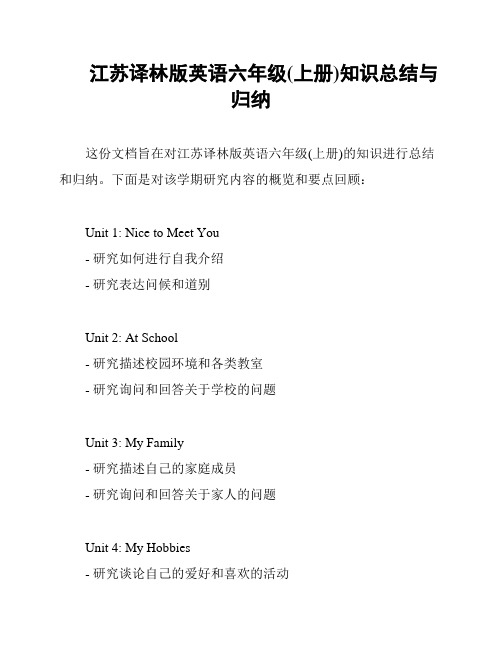
江苏译林版英语六年级(上册)知识总结与
归纳
这份文档旨在对江苏译林版英语六年级(上册)的知识进行总结和归纳。
下面是对该学期研究内容的概览和要点回顾:
Unit 1: Nice to Meet You
- 研究如何进行自我介绍
- 研究表达问候和道别
Unit 2: At School
- 研究描述校园环境和各类教室
- 研究询问和回答关于学校的问题
Unit 3: My Family
- 研究描述自己的家庭成员
- 研究询问和回答关于家人的问题
Unit 4: My Hobbies
- 研究谈论自己的爱好和喜欢的活动
- 研究询问和回答关于兴趣爱好的问题
Unit 5: Food and Drinks
- 研究讨论食物和饮料
- 研究询问和回答关于喜欢和不喜欢的食物的问题
Unit 6: At the Zoo
- 研究描绘动物和它们的性
- 研究询问和回答关于动物园的问题
Unit 7: My Week
- 研究描述一周中的活动和日程安排
- 研究询问和回答关于日程安排的问题
总结以上内容,六年级上册的研究内容围绕自我介绍、学校、家庭、爱好、食物、动物以及时间安排展开。
通过这些研究,学生们能够提高英语口语表达能力,并且了解更多有关这些主题的词汇和句型。
希望这份文档对大家有所帮助!
(字数:204字)。
译林版牛津英语小学1-6单词分类记忆

WORD格式英语1-6年级单词系统分33.marker水彩笔34.scissors剪子类,记得分享到朋友圈,35.envelope信封供孩子学习哦36.stamp邮票37.glue胶水1.blue蓝色(的)2.green绿色(的)3.red红色(的)4.yellow黄色(的)5.orange橘色(的)6.purple紫色(的)7.white白色(的)8.black黑色(的)9.brown棕色(的)10.school学校11.book书12.chair椅子13.class班14.desk书桌15.student学生17.office办公室18.gym体育馆19.classroom教室20.blackboard黑板21.schoolbus校车22.lights灯23.lesson课24.card卡片25.book书26.notebook笔记本27.paper纸28.pencil铅笔29.pencilcase笔袋30.pen钢笔31.eraser橡皮32.ruler尺子38.number数字39.zero零40.one一41.two二42.three三43.four四44.five五45.six六46.seven七47.eight八48.nine九49.ten十50.eleven十一51.twelve十二52.thirteen十三53.fourteen十四54.fifteen十五55.sixteen十六56.seventeen十七57.eighteen十八58.nineteen十九59.twenty二十60.thirty三十61.forty四十62.fifty五十63.sixty六十64.seventy七十65.eighty八十66.ninety九十67.onehundred一百68.ninehundred九百69.onethousand一千WORD格式70.tenthousand一万107.nose鼻子71.first第一108.elbow胳膊肘72.second第二109.finger手指73.third第三110.shoulder肩膀74.fourth第四111.stomach肚子75.fifth第五112.knee膝盖76.sixth第六113.toe脚趾77.seventh第七114.ankle脚踝78.eighth第八115.wrist手腕79.ninth第九116.home家80.tenth第十117.bathroom卫生间81.family家庭118.bed床82.father爸爸119.bedroom卧室83.dad爸爸120.kitchen厨房84.mother妈妈121.livingroom客厅85.mum妈妈122.room房间86.aunt姨/姑妈123.house房子87.uncle叔/舅舅124.door门88.cousin表兄妹125.window窗户89.nephew侄子126.bathroom浴室90.niece侄女127.bathtub浴缸91.brother哥/弟128.ceiling天花板92.sister姐/妹129.dish盘子93.daughter女儿130.refrigerator电冰箱94.son儿子131.sink洗涤槽95.grandpa爷爷/姥爷132.stove炉灶96.grandma奶奶/姥姥133.toilet厕所97.body身体134.wall墙98.arm胳膊mp灯99.ear耳朵136.lights等;饰灯100.eye眼睛137.closet橱柜101.face脸138.dresser化妆台102.foot脚139.shower淋浴103.hand手140.couchXX发104.head头141.towel毛巾105.leg腿142.blouse女衬衫106.mouth嘴143.clothes衣服WORD格式144.dress连衣裙181.February二月145.pants裤子182.March三月146.shirt衬衣183.April四月147.shorts短裤184.May五月148.skirt短裙185.June六月149.T-shirtT恤衫186.July七月150.socks袜子187.August八月151.pajamas睡衣裤188.September九月152.gloves手套189.October十月153.boots靴子190.November十一月154.jacket夹克191.December十二月155.scarf围巾192.season季节156.sweater毛衣193.spring春天157.swimsuit女式游泳衣194.summer夏天158.sandals凉鞋;拖鞋195.fall秋天159.mittens连指手套196.winter冬天160.year年197.people人(们)161.time时间198.boy男孩162.day天199.girl女孩163.week周200.Chinese中国人164.morning早上201.doctor医生165.noon中午202.friend朋友166.evening晚上203.neighbor邻居167.night夜晚204.cashier出纳员168.today今天205.clerk办事员169.tomorrow明天206.waitress女服务员170.birthdayn.生日207.waiter男服务员171.holidayn.假日;节日208.actor男演员172.Christmasn.圣诞节209.actress女演员173.Monday星期一210.businessman商人174.Tuesday星期二211.businesswoman女商人175.Wednesday星期三212.judge法官176.Thursday星期四213.baby婴儿177.Friday星期五214.child孩子178.Saturday星期六215.children孩子们179.Sunday星期日216.man男人180.January一月217.men男人们WORD格式218.woman女人255.grass草219.women女人们256.flower花220.Santa圣诞老人257.leaves树叶221.singer歌手258.farm农场222.shape形状259.field田地223.circle圆圈260.mud泥224.line直线261.pond池塘225.rectangle长方形262.sand沙226.square方形263.rose玫瑰227.triangle三角形264.star星星228.breakfast早饭265.sun太阳229.supper晚饭266.snow下雪230.lunch午饭267.rain下雨231.meat肉268.wind风232.pork猪肉269.corner角落233.chicken鸡肉270.park公园234.beef牛肉271.playground游乐场mb羔羊肉272.shop商店236.cookies饼干273.world世界237.flour面粉274.country乡村238.sugar糖275.city城市239.egg鸡蛋276.China中国240.snack小吃;零食277.Canada加拿大241.flour面粉278.hall大厅242.oil油279.hotel饭店;旅馆243.salt盐280.city城市244.sky天空281.street街道245.cloud云282.restaurant餐馆246.beach海滩283.market市场247.boat船284.mall商业街ke湖285.office办公室249.ocean海洋286.fun乐趣250.wind风287.address地址251.mountain山288.letter信252.rock岩石289.song歌曲253.tree树290.umbrella雨伞254.river河291.thing东西WORD格式292.e-mail电子329.short矮293.card卡片330.tall高294.ticket车票331.famous有名的295.trip旅行332.right正确的296.flag旗333.wrong错误的297.party晚会;聚会334.bad坏的298.story故事335.beautiful漂亮的299.zero零度336.best最好的300.surprise意外的惊喜337.better最好的301.car小汽车338.Chinese中国的302puter计算机339.western西方的303.toy玩具340.special特别的304.camera照相机st上一个305.film胶卷342.next下一个306.picture照片343.easy容易的307.postcard明信片344.fast快;快速的308.gift礼物345.hard难;困难的309.movie电影346.loud响亮的310.music音乐347.quick快速的311.snowball雪球348.quiet安静的312.snowman雪人349.slow缓慢的313.wall墙350.once一次314.cold冷351.well好315.happy高兴的352.together一起316.hot热的353.never从来没有317.hungry饿的354.sometimes有时318.sad伤心的355.always总是;一直319.thirsty渴的356.loudly响亮地320.old老的357.quickly快速地321.young年轻的358.quietly安静地322.delicious好吃的359.slowly缓慢地323.favourite最喜爱的360.early早地324.lovely可爱的361.finally最后325.new新的362.soon不久326.nice好的363.then然后;那么327.poor可怜的364.very非常te晚的365.cold冷的WORD格式;刺痛366.warm温暖的403.hurt伤367.hot热的404.jump跳;蹦跳368.snowy下雪的405.leave离开369.rainy下雨的406.look看;瞧370.sunny晴朗的407.point指;指向371.windy刮风的408.run跑372.cloudy多云的409.see看见373.draw画410.send寄出;送374.hear听见;听到411.sit坐375.know知道412.stand站;站立376.show给⋯⋯看413.wentgo过去式377.walk走414.bring带来378.listen听415.cook做饭379.meet见到;遇到416.dry擦干380.miss丢掉/想念417.fall摔倒381.minus减418.give给382.need需要419.invite邀请383.plus加420.open打开384.put放421.skate滑冰385.smell闻422.ski滑雪为386.take拿;带走423.think想;认387.write写424.visit参观388.wear穿425.wash洗389.eat吃426.begin开始390.find找到427.call打()391.go去;走428.carry搬运392.help帮助429.fly放飞393.learn学习;学会430.forget忘记394.like喜欢431.lie躺395.love爱;热爱432.miss想念396.play玩433.skip跳;蹦397.see看见434.swim游泳398.sleep睡觉435.remember记得;想起399.read读436.ring(铃)响400.buy买437.tell告诉401.arrive到达438.wake叫醒402e来439.will将;会WORD格式477.their他(她)们的440.clean打扫441.skate滑冰478.my我的442.ski滑雪479.your你的443.teach教480.them他们(宾格)444.visit拜访;参观481.mine我的482.yours你的445.watch观看483.that那;那个446.beside在⋯⋯旁边447.above在⋯⋯上面484.these这些448.below在⋯⋯下面485.this这;这个449.at在⋯⋯地方486.those那些450.from从⋯⋯来487.some一些451.under在⋯⋯下面488.any任何一个452.with用;和489.all全部,都453.near附近490.something某物454.inside(在)里面491.every每个455.outside(在)外面492.chicken鸡;公鸡456.behind在⋯⋯后面493.rooster鸡457.top顶;顶部494.cow奶牛458.bottom底部;末尾495.duck鸭子459.left左;左边496.pig猪460.right右;右边497.cat猫461.east东498.dog狗462.south南499.goat山羊463.west西500.sheep绵羊464.north北501.bird鸟465.around在⋯周围502.rabbit兔子466.inthemiddleof在..中间503.donkey驴467.infrontof在⋯⋯前面504.mouse老鼠468.from⋯to从⋯⋯到505.horse马469.nextto紧挨着506.snake蛇470.towards朝⋯向⋯507.wing翅膀471.I我508.feather羽毛472.me我(宾格)509.fur皮毛473.you你;你们510.paws爪子474.he他511.tail尾巴475.she她512.lion狮子476.they他(她)们513.tiger老虎WORD格式514.elephant大象551.puton穿上;戴上515.kangaroo袋鼠552.stayathome呆在家里516.monkey猴子553.gotoschool去学校517.wolf狼554.answerthephone接518.camel骆驼555.callonthephone打鸟556.hungupthephone519.ostrich鸵鹿557.looklike看起来像520.giraffe长颈521.panda熊猫558.makeacall拨522.snake蛇559.swimmingpool游泳池523.zebra斑马560.talkonthephone在通话话524.dragon龙561.talkto和⋯说525.violin小提琴562.takeoff脱掉526.bike自行车563.movietheatre电影院527.wheel车轮564.trafficlights交通灯528.tire车胎565.grocerystore杂货店529.chain车链566.departmentstore百货商店530.bell铃铛567.bookdepartment书店531.car小汽车568.toydepartment玩具部532.truck大卡车569.clothesshop服装店533.bus公共汽车570.bicycleshop自行车店534.cab出租车571.officebuilding办公大楼535.taxi出租车572.apartmentbuilding公寓大楼536.airplane飞机573.radioshow广播电台目节537.train火车show电视538.boat船575.icecream冰激凌539.ship轮船576.busstop公共汽车站540.turnright右转541.turnleft左转542.turnoff关掉543.turnon打开544.turnaround转圈545.walkforward向前走546.walkbackward向后走547.gostraight径直走548.goupthestairs上楼549.godownthestairs下楼550.takeoff脱下。
牛津小学英语六年级下册知识点总结(词组+句型)
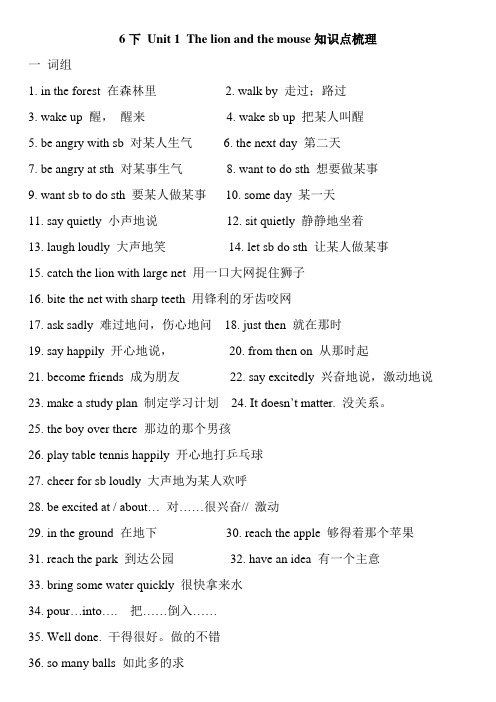
6下Unit 1 The lion and the mouse知识点梳理一词组1. in the forest 在森林里2. walk by 走过;路过3. wake up 醒,醒来4. wake sb up 把某人叫醒5. be angry with sb 对某人生气6. the next day 第二天7. be angry at sth 对某事生气8. want to do sth 想要做某事9. want sb to do sth 要某人做某事10. some day 某一天11. say quietly 小声地说 12. sit quietly 静静地坐着13. laugh loudly 大声地笑14. let sb do sth 让某人做某事15. catch the lion with large net 用一口大网捉住狮子16. bite the net with sharp teeth 用锋利的牙齿咬网17. ask sadly 难过地问,伤心地问18. just then 就在那时19. say happily 开心地说,20. from then on 从那时起21. become friends 成为朋友22. say excitedly 兴奋地说,激动地说23. make a study plan 制定学习计划24. It doesn’t matter. 没关系。
25. the boy over there 那边的那个男孩26. play table tennis happily 开心地打乒乓球27. cheer for sb loudly 大声地为某人欢呼28. be excited at / about… 对……很兴奋// 激动29. in the ground 在地下 30. reach the apple 够得着那个苹果31. reach the park 到达公园32. have an idea 有一个主意33. bring some water quickly 很快拿来水34. pour…into….把……倒入……35. Well done. 干得很好。
译林六年级英语6A6B知识点

六年级上册英语6A6B单元知识点详解Unit 1 Do you want to watch a game show?1.祈使句的用法例如:Watch a movie with me.= Do ______ ______ a movie______.2.物品和花样滑冰的动词短语go ice-skating = ______ ______,例如:I want to go ice-skating. = I want to ______ ______ ______.draw pictures= ________ pictures. 例如:She is drawing pictures. = She is ______ ______.do kung fu=______ kung fu. 例如:They do kung fu very well. = They ______ ______ ______ very well.3.连系动词系表语4.询问人们是否想要做事Do you want to do…? 或Would you like to do…?5.询问人们想要购买物Can I help you? = What do you ______?或 What would you______to ______?例如:Can I help you? = What do you want to ______?Unit Do you want to go to a movie?1. 动词ing形式作宾语- Do you enjoy ______ kung fu? (do kung fu)- She can’t stand ______ teachers.(listen to)动词ing形式的动词作宾语时,加-ing后,构成动词-ing形式。
2.对所希望、期望的行为提问What would you like to do在询问对所希望、期望的行为时,常用句型:What would you like to do?例如:- __________ you like to do?- I’d like to play basketball.3. because引导的简单原因状语从句She doesn’t go to school _______ she is ill.-因为她病了,她没有去学校。
六下英语各单元知识点汇总译林版

六下英语各单元知识点汇总译林版Unit1 Where's your pen pal from?1. 动词be的用法:用于描述人或物的特征、身份、国籍等。
2.询问国籍的用语:住在哪里?来自哪里?3. 询问家庭成员:Who's that man/the boy/the girl/the woman in the photo?4. 介绍自己的国家:I'm from China. It's in Asia.5. 询问并描述地理位置:Where is it? It's in the south of China.6. 表示方位的词:north, south, east, west7. 询问个人信息:What's your name, age, address, telephone number?8. 注意:第三人称单数的be动词用is。
Unit2 My day1.询问人们的日常活动:- What do you often do on weekends?- Do you often watch TV in the evening?- Do you often read after dinner?2.描述一天中的活动顺序:I get up at 7 o'clock. Then I have breakfast. After that, I go to school.3. 介词on的用法:on Monday, on Tuesday等等。
4. 表示时间的表达:in the morning/afternoon/evening/night, at 7 o'clock等。
5. 小学生常见的一些科目名称:Chinese, English, Math, Science 等。
6. 物品名称:book, pen, pencil, ruler等。
7. 询问喜欢的活动:What do you like doing after school?8. 询问他人的常见活动:Does he/she often...?Unit3 At the zoo1. 描述动物:long neck, big eyes, sharp teeth等。
小学英语六年级下册(牛津译林版)Unit3Ahealthydiet知识点归纳与练习题
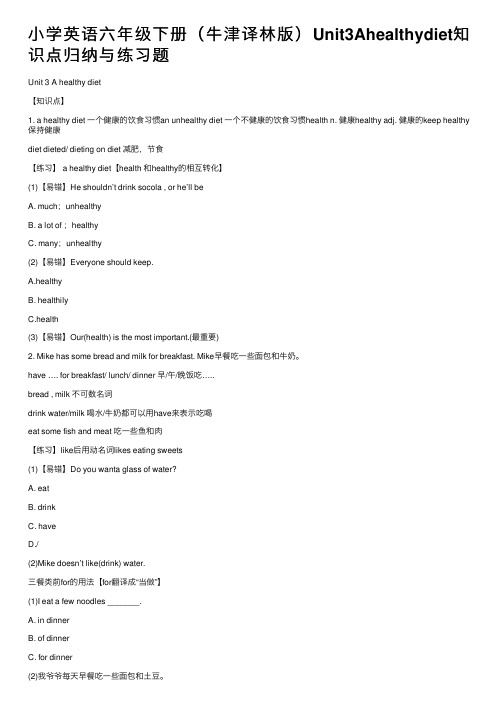
⼩学英语六年级下册(⽜津译林版)Unit3Ahealthydiet知识点归纳与练习题Unit 3 A healthy diet【知识点】1. a healthy diet ⼀个健康的饮⾷习惯an unhealthy diet ⼀个不健康的饮⾷习惯health n. 健康healthy adj. 健康的keep healthy 保持健康diet dieted/ dieting on diet 减肥,节⾷【练习】 a healthy diet【health 和healthy的相互转化】(1)【易错】He shouldn’t drink socola , or he’ll beA. much;unhealthyB. a lot of ;healthyC. many;unhealthy(2)【易错】Everyone should keep.A.healthyB. healthilyC.health(3)【易错】Our(health) is the most important.(最重要)2. Mike has some bread and milk for breakfast. Mike早餐吃⼀些⾯包和⽜奶。
have …. for breakfast/ lunch/ dinner 早/午/晚饭吃…..bread , milk 不可数名词drink water/milk 喝⽔/⽜奶都可以⽤have来表⽰吃喝eat some fish and meat 吃⼀些鱼和⾁【练习】like后⽤动名词likes eating sweets(1)【易错】Do you wanta glass of water?A. eatB. drinkC. haveD./(2)Mike doesn’t like(drink) water.三餐类前for的⽤法【for翻译成“当做”】(1)I eat a few noodles _______.A. in dinnerB. of dinnerC. for dinnerMy grandpasome bread andbreakfastday.重要句型:What do you have for breakfast?你早餐吃什么?What do you often havebreakfast? A. in B. for C. about D. of3. Yang Ling likes sweet food too, but she eats a little at a time. 杨玲也喜欢吃甜⾷,但是她⼀次只吃⼀点点。
(完整word版)译林版6BUnit5知识点梳理
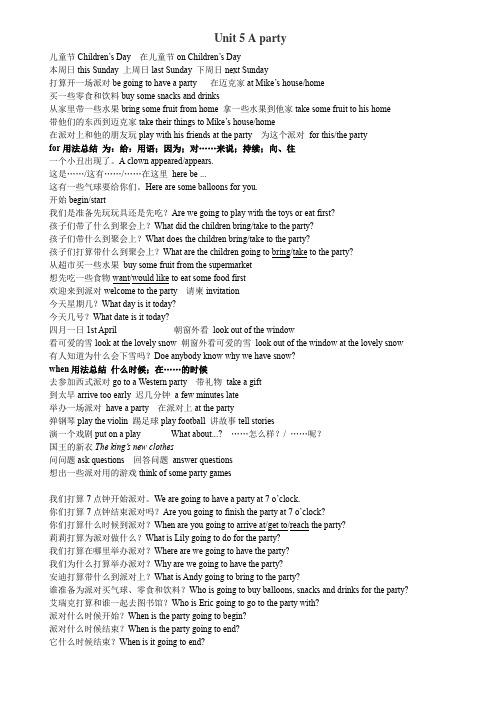
Unit 5 A party儿童节Children’s Day 在儿童节on Children’s Day本周日this Sunday 上周日last Sunday 下周日next Sunday打算开一场派对be going to have a party 在迈克家at Mike’s house/home买一些零食和饮料buy some snacks and drinks从家里带一些水果bring some fruit from home 拿一些水果到他家take some fruit to his home带他们的东西到迈克家take their things to Mike’s house/home在派对上和他的朋友玩play with his friends at the party 为这个派对for this/the partyfor用法总结为:给:用语;因为;对……来说;持续;向、往一个小丑出现了。
A clown appeared/appears.这是……/这有……/……在这里here be ...这有一些气球要给你们。
Here are some balloons for you.开始begin/start我们是准备先玩玩具还是先吃?Are we going to play with the toys or eat first?孩子们带了什么到聚会上?What did the children bring/take to the party?孩子们带什么到聚会上?What does the children bring/take to the party?孩子们打算带什么到聚会上?What are the children going to bring/take to the party?从超市买一些水果buy some fruit from the supermarket想先吃一些食物want/would like to eat some food first欢迎来到派对welcome to the party 请柬invitation今天星期几?What day is it today?今天几号?What date is it today?四月一日1st April 朝窗外看look out of the window看可爱的雪look at the lovely snow 朝窗外看可爱的雪look out of the window at the lovely snow 有人知道为什么会下雪吗?Doe anybody know why we have snow?when用法总结什么时候;在……的时候去参加西式派对go to a Western party 带礼物take a gift到太早arrive too early 迟几分钟a few minutes late举办一场派对have a party 在派对上at the party弹钢琴play the violin 踢足球play football 讲故事tell stories演一个戏剧put on a play What about...? ……怎么样?/ ……呢?国王的新衣The king’s new clothes问问题ask questions 回答问题answer questions想出一些派对用的游戏think of some party games我们打算7点钟开始派对。
英语译林(牛津)版英语六年级(上册)知识点整理
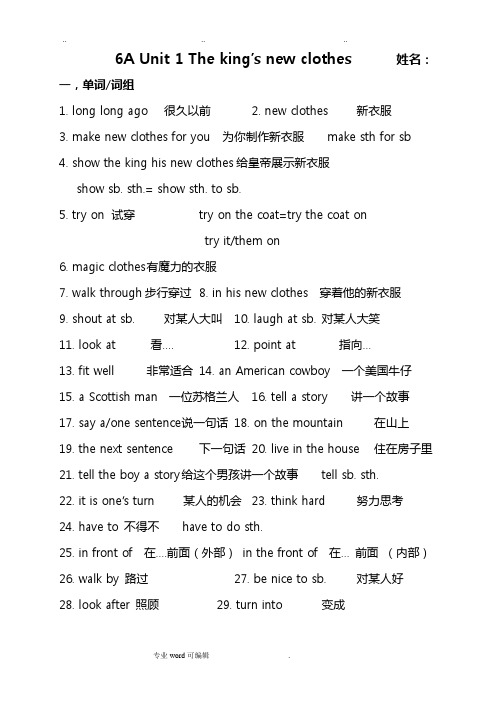
.. .. ..6A Unit 1 The king’s new clothes姓名:一,单词/词组1. long long ago 很久以前2. new clothes 新衣服3. make new clothes for you 为你制作新衣服make sth for sb4. show the king his new clothes给皇帝展示新衣服show sb. sth.= show sth. to sb.5. try on 试穿try on the coat=try the coat ontry it/them on6. magic clothes 有魔力的衣服7. walk through步行穿过8. in his new clothes 穿着他的新衣服9. shout at sb. 对某人大叫10. laugh at sb. 对某人大笑11. look at 看….12. point at 指向…13. fit well 非常适合14. an American cowboy 一个美国牛仔15. a Scottish man 一位苏格兰人16. tell a story 讲一个故事17. say a/one sentence 说一句话18. on the mountain 在山上19. the next sentence 下一句话20. live in the house 住在房子里21. tell the boy a story 给这个男孩讲一个故事tell sb. sth.22. it is one’s turn 某人的机会23. think hard 努力思考24. have to 不得不have to do sth.25. in front of 在….前面(外部)in the front of 在… 前面(内部)26. walk by 路过27. be nice to sb. 对某人好28. look after 照顾29. turn into 变成二,句型1. Long long ago, there was a king. 很久很久以前,有一位国王。
- 1、下载文档前请自行甄别文档内容的完整性,平台不提供额外的编辑、内容补充、找答案等附加服务。
- 2、"仅部分预览"的文档,不可在线预览部分如存在完整性等问题,可反馈申请退款(可完整预览的文档不适用该条件!)。
- 3、如文档侵犯您的权益,请联系客服反馈,我们会尽快为您处理(人工客服工作时间:9:00-18:30)。
Unit1 The lion and the mousemouse复数老鼠mice 鼠标mousesbig,large区别large:常指面积或范围大,有广阔和众多的含义,其反义词是small。
large比较正式。
big:常指程度,规模,容积,重量,数量大,含有庞大、笨重的意思,还可表示“伟大,重要”之意,其反义词是little,big较为口语化wake up:up是副词,不可后接代词,代词放中间,名称中间后面都可以放。
the next day 第二天,是指某个特定时间的后一天,既可指过去,也可指将来tomorrow是指从今天向后的一天,即明天some day 表示将来不确定的某一天,表示将来的时间状语,因此时态用一般将来时just then 就在那时,表示过去的时间状语,因此时态用一般过去时from then on 从那时起,表示过去的时间状语,因此时态用一般过去时from now on 从今往后,表示将来的时间状语,因此时态用一般将来时副词接在动词后面speak loudly形容词接在名词前面或be动词后面作表语the old manwalk by走过路过let...go 释放放开pour...into把......倒入in the forest 在森林里large and strong又大又壮so small and weak这么小和弱let sb. do 让某人干某事well done 干得好get out from the net破网而出become friends变成朋友cheer for...为...而欢呼be good at ...=do well in...擅长in the ground在地上in the hole在洞里look sad看起来伤心with his teeth 用他的牙齿catch(caught)...with用...捉住...have an idea有一个主意(想法)have a good(bad) idea反义词strong 与weak(同音词week) bite过去式bit hit过去式hitunit2 good habits宾语补足语:英语中,有些及物动词后接宾语时,还需要加一个词或短语来补充说明宾语的情况,这样的词或短语叫做宾语补足语。
可以作宾语补足语的有名词、形容词、副词、介词短语、动词不定式V-ed形式或V-ing形式等。
He keeps his room clean and tidy 他保持房间既干净又整洁get up early起床早go to bed late 睡觉迟finish his homework 完成他的家庭作业brush one’s teeth 刷牙run through 跑过put…in order把……整理得井井有条come to see her 过来看她go into=enter走进many good(bad) habits 许多好(坏)的习惯be late for...做...迟到be bad for...对...有害know……well 对……非常了解show sb.around带领某人参观last night=yesterday evening l isten to his teachers听他老师的话反义词late与early finish与start(begin) messy与tidy(clean) fast与slow(ly) before与afterunit3 a healthy diet可数与不可数名词的常用修饰词:一、修饰可数名词:these, those, few, many, a good [great] many, a great [good/ large] number of,scores of, dozens of二、修饰不可数名词:this, that, little, a bit of, much, a great deal of, a great [ large] amount of 等:三、可以同时修饰可数不可数名词:如all, some, enough, a lot of, lots of, plenty of, a (large) quantity of 等:only位置实义动词前,其它动词后have...for breakfast(lunch dinner) every day每天every week每周a healthy diet 健康的饮食too much太多at a time 一次 a lot of很多in the fridge在冰箱里go home回家have a rest休息一下反义词ill 与healthy(fit) take拿走带走与bring 拿来带来unit4 road safety情态助动词的用法:表示说话人的情绪、态度或与语气的动词,但不能单独作谓语,无人称和数的变化,只能和其他动词原形构成谓语。
所谓情态助动词+V否定式构成是在情态动词后面加“not”。
个别情态动词有现在式和过去式两种形式,过去式用来表达更加客气,委婉的语气。
have/has /had to 1.有人称时态变化 2.否定句don’t have to; doesn’t have to,didn’t have to3.疑问do does did开头4.回答Yes, you do. (No, you don’t have to.)keep safe=stay safe 保持安全look out for小心The bus goes on. 公交车继续行驶wait on/in/at 在哪里等Look out for sth: 小心什么东西look out = watch out = be careful 小心,仔细。
road saftey道路安全wait for 等待某人某物get on /off the bus 上/下公交车be careful about / with sth get on/off the metro上下地铁轿车是get in /out the carcross the road 过马路zebra crossing斑马线on the pavement在人行道上follow me 跟我学跟着我follow the rule(s)遵守规则traffic lights 交通灯in the UK 在英国反义词easy 与difficultlyunit5 A partybe going to do:主要表示计划、打算做某事,是已决定的并很可能发生的事。
一般将来时,与表示将来的时间状语连用,一般疑问句、否定句,变形是be动词be动词随主语变化put on 上演,表演/穿上,戴上on Children’s Day 在儿童节this Sunday 本周日at Mike’s house 在迈克的家(房子)里for the party 为聚会准备Class Party 班级聚会play with the toys 玩玩具和......玩play the piano 弹钢琴think of 想look out of the window 朝窗外看a few minutes late 晚几分钟bring sth.from sp. 从某地带某物bring sth.to sp. 带某物到某地玩得开心:have a some fun have a good time have a lot of fun enjoy oneself play happily反义词end(同义词)finish 与began(同义词start)unit6 An interesting countrylook for 强调寻找的过程 find强调寻找的结果find强调偶然性,一般指找到某个东西find out强调经过一番过程,指查明某个事情的真相或找到解决问题的办法exciting带-ing 的词表示物的性质和状态,修饰物 excited带-ed 的词表示人的感受,修饰人,都可以做定语和表语。
类似的有interested/interesting,moved/moving,surprised /surprising,pleased/pleasing,bored/boring,tired /tiring,amazed/amazing,frightened/frightening,puzzled/puzzlingbe excited about 对......感到兴奋about后接物或事send me some photos / send some photos to me send sb. sth.=send sth. to sb.welcome sb.或welcome to sp. be busy with sth. =be busy doing sth.on the Internet在网上 learn about学习关于,了解 learn...from...从/向...学习...before the lessons在课前 read about阅读关于 an interesting country一个有趣的国家sports-lovers 运动爱好者 come from 来自 want to be a cook想成为厨师wait and see等着瞧 look like看上去像 for example 例如 over there 在那边learn同义词study visitor 动词visitunit7 Summer holiday planshow long是对一段时间进行提问的疑问短语when是对具体时间进行提问的疑问副词表示赞同用语:That sounds great. Good idea. That’s wonderful. Great. That sounds wonderful. All right. sound great听起来很棒sound like听起来像sound是系动词,后接形容词talk about sth.谈论某事talk to/with sb.与某人交谈stay at home 待在家里stay in bed待在床上be different from 与.......不同take photos 拍照plans for有关的.......计划go back to 回去summer holiday plans Uluru in Australia the Grand Canyon in the USNiagara Falls in Canada read a travel book Buckingham Palace in the UKwant to be a traveler travel around the world travel plansphotos同义词picture same反义词differenceunit8 our dreams动名词做主语,谓语动词用第三人称单数What do you want to be... 回答I want to be a/an +职业all both 都的意思,放在系动词、助动词、情态动词之后,实义动词之前。
